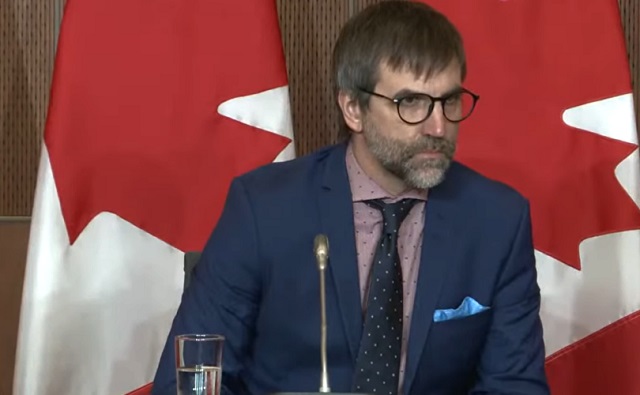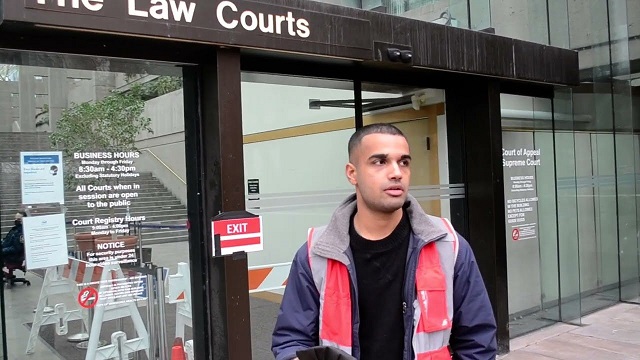Alberta
Trudeau gov’t pushing forward with net-zero regulations despite Supreme Court ruling

From LifeSiteNews
Environment Minister Steven Guilbeault claimed that a Supreme Court ruling returning power to the provinces does not affect federal plans to cap emissions from the oil and gas sector, nor the Clean Electricity Regulations.
The Liberal government is moving ahead with net-zero emission regulations despite a Supreme Court ruling restricting the federal government’s “no more pipelines” legislation.
On October 16, Environment Minister Steven Guilbeault declared that the Supreme Court ruling returning power to the provinces does not affect federal plans to cap emissions from the oil and gas sector, nor the Clean Electricity Regulations.
“The opinion of the court does not call into question other regulatory initiatives under development, and we are confident that they are within the purview of the federal government,” Guilbeault said in a statement to The Globe and Mail.
Guilbeault further claimed that the regulations are within Ottawa’s power to regulate as they are based on different federal authorities than the Impact Assessment Act.
The decision to press ahead with energy regulation comes on the heel of an October 13 ruling by the Canadian Supreme Court which found the Trudeau government’s 2019 Impact Assessment Act (IAA), dubbed the “no more pipelines” bill by critics, to be largely unconstitutional.
The Supreme Court declared that most of the IAA was unconstitutional with the exception of Sections 81 to 91, which refer to projects under federal authority on federal lands or outside Canada. Therefore, those projects would fall under federal jurisdiction and are not unconstitutional for the federal government to regulate.
However, the Court’s ruling did restore provincial autonomy over projects that don’t fall under federal jurisdiction, determining that the Trudeau government’s requirement that all provincial natural resource projects conform to the Liberals’ social and “climate change” policies is unconstitutional.
Guilbeault’s Monday statement comes as Canadians await the federal government’s amendment of the Canadian Environmental Protection Act, which is designed to phase out natural gas plants by 2030. The act is expected to be the means to implement the emissions cap and electricity regulations across the country.
His position echoes that of legal experts who warned that the Supreme Court’s decision will likely have no impact on other federal moves such as the Clean Electricity Regulations or oil sands emissions caps.
However, Guilbeault seems to be backtracking from his initial statement following the Supreme Court ruling; on that day, Guilbeault declared that the federal government is willing to “collaborate” with the provinces.
“We accept the court’s opinion,” he said during a virtual media meeting last Friday. “It provides new guidance on the Impact Assessment Act, while explicitly affirming the right of the government of Canada to put in place impact assessment legislation and collaborate with provinces on environmental protection.”
“We will now take this back and work quickly to improve the legislation through Parliament,” Guilbeault announced, but failed to give a timeline for the new legislation.
Alberta Premier Danielle Smith, a staunch opposer of Trudeau’s net-zero regulations, celebrated the court decision as returning power to the provinces.
“Today’s decision significantly strengthens our legal position,” Smith told reporters. “If they’re [the federal government] trying to pretend that they somehow still have the right to proceed with those offensive pieces of legislation that are clearly in our jurisdiction, they’re fooling themselves.”
Beyond the IAA, Alberta has been consistent in its fight against Trudeau’s push for increased energy regulations, with Smith repeatedly refusing to submit to the Liberal government’s demands, warning that Canadians could freeze in the winter if new “clean” electricity and energy regulations are enforced.
Late last month, Smith announced that she is preparing to use her province’s Sovereignty Act to fight the electricity regulations if the Trudeau government does not relent.
The draft version of the federal government’s “Clean Electricity Regulations” (CER) states that there will be billions in higher costs associated with a so-called “green” power transition, especially in the resource-rich provinces of Alberta, Saskatchewan, New Brunswick, and Nova Scotia, which use natural gas and coal to fuel power plants.
Business executives in Alberta’s energy sector have also warned that the Trudeau government’s fast-paced “green” transition could lead to unreliability in the power grid.
In addition to Smith, Saskatchewan Premier Scott Moe has likewise promised to fight back against Trudeau’s new regulations, saying recently that “Trudeau’s net-zero electricity regulations are unaffordable, unrealistic and unconstitutional.”
“They will drive electricity rates through the roof and leave Saskatchewan with an unreliable power supply. Our government will not let the federal government do that to the Saskatchewan people,” he charged.
The Trudeau government’s current environmental goals – in lockstep with the United Nations’ “2030 Agenda for Sustainable Development” – include phasing out coal-fired power plants, reducing fertilizer usage, and curbing natural gas use over the coming decades.
The reduction and eventual elimination of the use of so-called “fossil fuels” and a transition to unreliable “green” energy has also been pushed by the World Economic Forum (WEF) – the globalist group behind the socialist “Great Reset” agenda – an organization which Trudeau and some of his cabinet are involved.
Alberta
Former senior financial advisor charged with embezzling millions from Red Deer area residents

News release from Alberta RCMP
Former senior financial advisor charged for misappropriating nearly $5 million from clients
On April 4, 2024, the RCMP’s Provincial Financial Crime Team charged a Calgary resident for fraud-related offences after embezzling millions of dollars from his clients while serving as a senior financial advisor.
Following a thorough investigation, the accused is alleged to have fraudulently withdrawn funds from client accounts and deposited them into bank accounts he personally controlled. A total of sixteen victims were identified in the Red Deer area and suffered a combined loss of nearly $5 million.
Marc St. Pierre, 52, a resident of Calgary, was arrested and charged with:
- Fraud over $5,000 contrary to section 380(1)(a) of the Criminal Code; and,
- Theft over $5,000 contrary to section 344(a) of the Criminal Code.
St. Pierre is scheduled to appear in Red Deer Provincial Court on May 14, 2024.
“The ability for financial advisors to leverage their position to conduct frauds and investment scams represents a significant risk to the integrity of Alberta’s financial institutions. The investigation serves as an important reminder for all banking clients to regularly check their accounts for any suspicious activity and to report it to their bank’s fraud prevention team.”
- Sgt. John Lamming, Provincial Financial Crime Team
The Provincial Financial Crime Team is a specialized unit that conducts investigations relating to multi-jurisdictional serious fraud, investments scams and corruption.
Alberta
Political parties will be part of municipal elections in Edmonton and Calgary pilot projects

Strengthening Alberta’s local elections
Alberta’s government is introducing legislation to ensure Albertans can rely on transparent, free and fair elections, and municipally-elected officials have clearer accountability measures.
In a democratic society, Albertans expect their local elections to be free and fair, and their elected officials to be held to account by clear rules that govern their local councils. The Municipal Affairs Statutes Amendment Act proposes amendments to the Local Authorities Election Act (LAEA) and the Municipal Government Act (MGA) to add greater transparency to local election processes and ensure local councils and elected officials continue to remain accountable to the citizens who elected them.
“Our government is committed to strengthening Albertans’ trust in their local governments and the democratic process that elects local leaders. The changes we are making increase transparency for Alberta voters and provide surety their votes will be counted accurately. We know how important local democracy is to Albertans, and we will work with local authorities to protect and enhance the integrity of local elections.”
Local Authorities Election Act
Albertans expect free and fair elections and that’s why it’s important we strengthen the rules that govern local elections. To strengthen public trust in local elections, Alberta’s government will eliminate the use of electronic tabulators and other automated voting machines. All Albertans should be able to trust the methods and results of local elections; requiring all ballots to be counted by hand, clarifying rules and streamlining processes for scrutineers will provide voters greater assurance in the integrity of the results.
All eligible Albertans should be able to vote in local elections without impediment. Alberta’s government will limit the barriers for eligible voters to cast a ballot by expanding the use of special ballots. Currently, special ballots can only be requested for very specific reasons, including physical disability, absence from the municipality, or for municipal election workers. By expanding the use of special ballots, the government is encouraging more voter participation.
Amendments in the Municipal Affairs Statutes Amendment Act would increase transparency in local elections by enabling political parties at the local level. Political parties would be enabled in a pilot project for Edmonton and Calgary. The act will not require candidates to join a political party in order to run for a local or municipal office, but will create the opportunity to do so.
In addition, proposed changes to the Local Authorities Election Act would allow municipalities the option to require criminal record checks for local candidates, thus increasing transparency and trust in candidates who may go on to become elected officials.
Municipal Government Act
The role of an elected official is one with tremendous responsibility and expectations. Changes proposed to the Municipal Government Act (MGA) will strengthen the accountability of locally elected officials and councils. These include requiring mandatory orientation training for councillors, allowing elected officials to recuse themselves for real or perceived conflicts of interest without third-party review and requiring a councillor’s seat to become vacant upon disqualification.
If passed, the Municipal Affairs Statutes Amendment Act will also unlock new tools to build affordable and attainable housing across Alberta. Proposed amendments under the MGA would also create more options for municipalities to accelerate housing developments in their communities. Options include:
- Exempting non-profit, subsidized affordable housing from both municipal and education property taxes;
- Requiring municipalities to offer digital participation for public hearings about planning and development, and restricting municipalities from holding extra public hearings that are not already required by legislation; and
- Enabling municipalities to offer multi-year residential property tax exemptions.
Municipal Affairs will engage municipalities and other partners over the coming months to hear perspectives and gather feedback to help develop regulations.
Quick facts
- The LAEA establishes the framework for the conduct of elections in Alberta municipalities, school divisions, irrigation districts and Metis Settlements.
- The MGA establishes the rules governing the conduct of local elected officials once on council, as well as the overall administration and operation of municipal authorities in Alberta, including any policy those authorities may wish to implement.
Related information
-

 COVID-1917 hours ago
COVID-1917 hours agoPfizer reportedly withheld presence of cancer-linked DNA in COVID jabs from FDA, Health Canada
-

 Censorship Industrial Complex1 day ago
Censorship Industrial Complex1 day agoJordan Peterson, Canadian lawyer warn of ‘totalitarian’ impact of Trudeau’s ‘Online Harms’ bill
-

 Alberta2 days ago
Alberta2 days agoAlberta rejects unconstitutional cap on plastic production
-

 Alberta2 days ago
Alberta2 days agoAlberta official reveals ‘almost all’ wildfires in province this year have been started by humans
-

 Bruce Dowbiggin1 day ago
Bruce Dowbiggin1 day agoCome For The Graduate Studies, Stay For The Revolution
-

 Business2 days ago
Business2 days agoTaxpayers criticize Trudeau and Ford for Honda deal
-

 Business2 days ago
Business2 days agoDon’t be fooled by high-speed rail
-

 Alberta2 days ago
Alberta2 days agoPolitical parties will be part of municipal elections in Edmonton and Calgary pilot projects








